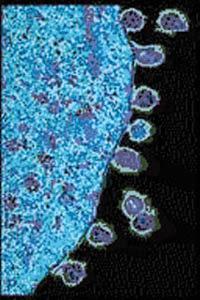HIV transmission through sexual contact takes place primarily through mucosal tissue. Factors such as genital inflammation and other sexually transmitted infections have been shown to increase the risk of HIV infection. Despite this knowledge, there is still a gap in knowledge of how the virus crosses the mucosal barrier and establishes infection. This studied found that the most abundant cells of the rectal and genital mucosa known as mucosal stromal fibroblasts increase the ability of HIV to infect CD4 T cells.
Upon viral entry into the rectal or genital tract, HIV comes into contact with resident dendritic cells. These cells carry the virus to CD4 T cells by a process known as trans-infection. There are also immature dendritic cells which capture HIV on a C-type lectin known as DC-SIGN to trans-infect CD4 cells. Dendritic cells are not as abundant in the mucosa as cells known as stromal fibroblasts.
Mucosal stromal fibroblasts provide the framework of tissues. They play a role in immune regulation and in tissue remodelling. Endometrial stromal fibroblasts have been extensively characterized and the researchers, from the University of California, used these cells to investigate what effect these cells and other stromal fibroblasts have on HIV infection compared to epithelial cells.
The researchers isolated stromal fibroblasts from the endometrium, cervix, foreskin, intestine and the male urethra. They found that these cells induced up to 100-fold increase in HIV infection of CD4 T cells. The stromal fibroblasts remained uninfected throughout this process.
Compared to dendritic cells, the stromal fibroblasts were more efficient at trans-infection. The mechanism of action was independent of DC-SIGN. Epithelial cells from the mucosa did not have the same effect as stromal fibroblasts on HIV infection. The epithelial cells actually inhibited HIV infection by secreting anti-viral molecules.
This study reveals that stromal fibroblasts from the mucosa are important in the establishment of HIV infection and helps explain how HIV is transferred to CD4 T cells so efficiently from mucosal surfaces. This mechanism was previously unknown for these cells and therefore new therapies may also need to take these cells into account. Inhibiting stromal fibroblast-mediated HIV infection may be required for an effective HIV vaccine.
Journal article: Neidleman et al., 2017. Mucosal stromal fibroblasts markedly enhance HIV infection of CD4+ T cells. PlosPathogens
Article by Thandeka Moyo












